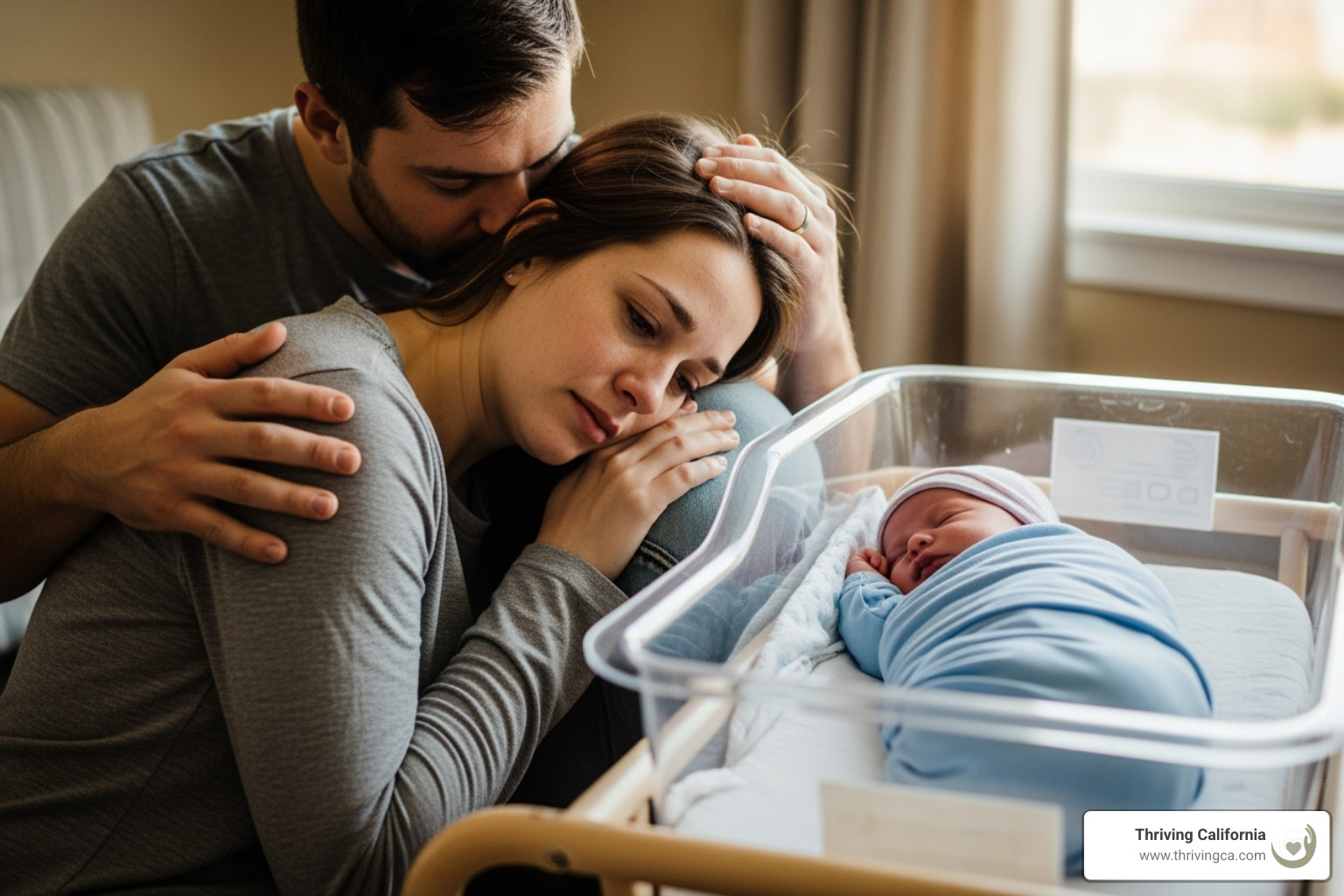Overcoming Postpartum Depression: Expert Support for New Mothers in California
The journey into parenthood rarely matches the idealized images we see in media. While moments of joy certainly exist, many new mothers and women face overwhelming emotions after giving birth. If you're experiencing feelings that go beyond typical mood swings after having a new baby, you're not alone. These postpartum depression symptoms don't reflect your love for your child or make you a bad parent.
Postpartum depression affects up to one in five new moms and adult women after childbirth, plus many fathers and non-birthing parents. This common mental health condition is highly treatable when women receive appropriate treatment from a mental health professional. The massive hormonal changes, including the rapid drop back to pre pregnancy levels, combined with sleep deprivation and life adjustments, create unique challenges that increase risk for depression and severe anxiety.
At Thriving California, our group practice of doctoral-level mental health providers specializes in helping mothers through postpartum depression. We offer evidence-based treatment tailored to each woman's life and unique journey. Whether you're in Napa, Lafayette, Thousand Oaks, or anywhere in California through telehealth, our expert team helps new moms manage symptoms and reclaim their well-being.
Understanding Postpartum Depression and Baby Blues
The weeks following childbirth represent one of life's most dramatic transitions. After giving birth, women experience significant physical and emotional changes that affect mental health. Understanding the difference between baby blues and postpartum depression becomes crucial for new mothers navigating this challenging time.
Baby Blues: A Common Experience
Up to 85% of mothers experience baby blues—a temporary phase appearing within the first week after a child's birth. Many women notice mood swings, frequent crying spells, and feeling anxious during this time. These baby blues symptoms, while unsettling, represent normal postpartum adjustment. The baby blues typically resolve within two to three weeks as hormones stabilize.
It's important to note that baby blues produce symptoms similar to postpartum depression, but they're temporary and don't require professional help from a mental health provider.
When Baby Blues Become Postpartum Depression
If difficult feelings persist beyond two weeks or severely impact your day to day life, you may have postpartum depression. Unlike baby blues, postpartum depression requires treatment and can worsen if left untreated. Postpartum depression symptoms include:
- Persistent depressed mood that doesn't lift
- Severe anxiety and panic attacks
- Trouble sleeping even when baby sleeps
- Frequent crying throughout the day
- Inability to care for your baby or yourself
- Feeling like a bad parent constantly
- Loss of interest in your new baby or life
Many mothers with untreated postpartum depression experience these symptoms for months. Women at higher risk include those with a family history of depression or previous mental health challenges.
Postpartum Anxiety and Related Conditions
Postpartum anxiety affects many moms alongside or separately from depression. New mothers experiencing this condition feel constantly on edge, with racing thoughts about their baby's safety. Physical symptoms include rapid heartbeat and trouble sleeping beyond normal new parent fatigue.
Some women develop obsessive patterns, experiencing intrusive thoughts about potential harm to their child. These distressing thoughts represent symptoms of illness, not character flaws, and require treatment from a mental health professional.
Recognizing Postpartum Psychosis
Postpartum psychosis represents a severe form of postpartum mood disorder affecting 1-2 per 1,000 mothers. This rare but serious condition requires immediate medical attention. Postpartum psychosis symptoms include:
- Significant confusion and disorientation
- Paranoia and delusions
- Hallucinations
- Thoughts of harming yourself or baby
Postpartum psychosis requires emergency treatment. If you notice these symptoms, seek immediate help. With proper treatment, women recover fully from postpartum psychosis.
Risk Factors and Warning Signs for New Moms
Understanding postpartum depression symptoms helps mothers seek timely professional help. Many women dismiss persistent symptoms as normal exhaustion after childbirth, but recognizing warning signs ensures appropriate treatment.
Emotional and Behavioral Symptoms
Depression manifests through multiple channels in a woman's life. Emotionally, mothers may feel sad constantly, experience emotional numbness, or feel disconnected from their new baby. Many moms report intense guilt about not feeling "right" or worry they're a bad parent.
Behaviorally, women with postpartum depression often:
- Withdraw from family and friends
- Experience frequent crying episodes
- Have trouble sleeping or sleep excessively
- Lose appetite or overeat
- Find basic self care overwhelming
- Struggle with day to day life tasks
Physical and Cognitive Changes
Postpartum depression affects thinking and physical health. Mothers may experience:
- Difficulty concentrating or making decisions
- Memory problems affecting daily life
- Physical aches without clear cause
- Severe fatigue beyond normal sleep deprivation
- Changes in breast milk production (stress-related)
Intrusive thoughts about harming yourself or your baby signal need for immediate help from a mental health provider.
Who's at Increased Risk?
Several factors increase risk for postpartum depression in women:
Biological Factors: The rapid drop in hormones after giving birth, returning to pre pregnancy levels, can trigger depression. Women with thyroid issues face higher risk.
Personal History: Mothers with previous depression, anxiety, or other mental health conditions have increased risk. Family history of depression also raises vulnerability.
Life Circumstances: Limited social support, relationship stress, financial worries, or traumatic childbirth experiences contribute to postpartum depression risk. First-time moms may feel particularly overwhelmed.
Physical Factors: Complications during pregnancy or childbirth, premature birth, or baby's health issues increase stress and depression risk.
Impact of Untreated Postpartum Depression
Without treatment, postpartum depression severely impacts mothers, children, and families. Untreated postpartum depression can:
- Evolve into chronic depression lasting years
- Interfere with mother-child bonding
- Affect child's emotional and cognitive development
- Strain relationships with partners
- Impact ability to care for your baby properly
Early treatment helps mothers recover faster and prevents long-term effects on the family.

Professional Treatment for Postpartum Depression
Seeking help for postpartum depression demonstrates strength, not weakness. Mental health professionals specializing in maternal mental health provide effective treatment helping women overcome postpartum depression.
When to Seek Professional Help
Contact a mental health provider if postpartum depression symptoms persist beyond two weeks or interfere with caring for your baby. Thoughts of harming yourself or your child require immediate attention.
While your doctor can provide depression screening, mental health professionals specializing in postpartum depression offer comprehensive treatment. At Thriving California, we simplify getting help. Book a free consultation or schedule directly with our doctoral-level clinicians.
Our Therapeutic Approach to Treat Depression
Our mental health professionals never use one-size-fits-all treatment. We customize therapy based on each woman's life, helping mothers process complex feelings after childbirth.
Psychodynamic and Relational Therapy: We explore how your childhood experiences influence your transition to motherhood. This depth-oriented approach helps mothers understand emotional patterns, facilitating lasting change. You'll examine how past relationships affect your current experience as a new parent.
Internal Family Systems Informed Work: This compassionate model helps moms understand different aspects of themselves—the overwhelmed mother part, the perfectionist part, the protective part. By developing self-compassion, mothers respond to challenges more effectively.
Gottman-Informed Couples Therapy: Postpartum depression affects entire families. We help partners navigate challenges together after childbirth, improving communication and strengthening bonds. Many couples find their relationship strained after a new baby arrives.
Birth Trauma Therapy: For mothers whose depression connects to traumatic birth experiences, we offer specialized treatment using somatic resourcing and bilateral stimulation. This therapy typically spans 3-6 sessions for individuals, helping process trauma and reduce symptoms.
What to Expect During Treatment
During initial sessions, we gather information about your symptoms and life circumstances. For ongoing therapy, expect weekly sessions building a strong therapeutic relationship where mothers feel comfortable exploring vulnerable feelings.
We help women understand their reactions and explore relevant experiences, whether examining childhood patterns or current stressors. The therapeutic process remains flexible—what brings mothers to therapy often evolves as deeper needs emerge.
For couples, we identify dynamics keeping you stuck and help communicate needs effectively. Partners learn to support each other through postpartum depression challenges.
Medication Considerations
For moderate to severe symptoms, medication helps many women manage postpartum depression alongside therapy. Antidepressants can:
- Reduce symptom intensity
- Stabilize mood swings
- Improve sleep quality
- Increase energy for self care
- Help mothers engage in therapy
Many medications are considered safe during breastfeeding and won't harm breast milk quality. Discuss benefits with your healthcare provider to make informed decisions about treatment.

Building Support Systems for Recovery
While professional treatment anchors recovery from postpartum depression, daily habits and support networks provide essential healing components for new moms.
Strengthening Your Support Network
Mothers need robust support during postpartum depression recovery. Communicate specific needs to family and friends rather than suffering alone. Instead of general statements, make specific requests: "Could you hold baby for an hour so I can rest?" or "Would you bring dinner Thursday?"
Partners play crucial roles in helping women through postpartum depression. Our couples therapy addresses relationship dynamics after childbirth, helping partners support each other effectively.
Many mothers benefit from connecting with other mothers experiencing similar symptoms, though formal groups aren't necessary when you have strong family support.
Essential Self Care Strategies
Self care during postpartum depression focuses on fundamentals supporting mental health rather than luxury indulgences.
Prioritize Rest and Sleep: Sleep deprivation worsens depression symptoms. New moms must get enough rest whenever possible. Sleep when baby sleeps, accept help for longer rest periods. This isn't luxury—it's treatment.
Nourish Your Body: Your brain needs quality nutrition to manage symptoms. Focus on regular meals with protein, healthy fats, and complex carbohydrates. Keep simple options accessible for easy self care.
Gentle Movement: Skip intense workouts. A 10-minute walk helps many women feel better, boosting mood and providing fresh air. Gentle stretching helps mothers reconnect with their bodies after pregnancy.
Realistic Expectations: Release perfectionism. Your job involves keeping yourself and baby safe and loved. Many moms struggle with feeling they're not doing enough—remember "good enough" truly suffices.
Mindfulness Practice: When feeling anxious or overwhelmed, try grounding exercises. Notice your surroundings using your senses. This present-moment focus helps calm severe anxiety.
Managing Daily Life with PPD
Creating structure helps mothers manage day to day life with postpartum depression:
- Establish simple routines for feeding, sleeping, and self care
- Accept help from family and friends without guilt
- Lower expectations for household tasks
- Focus on essential needs: safety, nutrition, rest
- Take care of basic hygiene even when difficult
- Connect with at least one supportive person daily

Frequently Asked Questions About Postpartum Depression
How long does postpartum depression last?
Duration varies among women. Untreated postpartum depression can persist for months or years, becoming chronic depression. With appropriate treatment from mental health professionals, most mothers experience significant improvement within weeks to months. Early treatment shortens recovery time.
Can I overcome postpartum depression without medication?
Yes, many women with mild to moderate symptoms recover through therapy alone. Our specialized approaches effectively treat depression by addressing root causes. However, severe symptoms often respond best to combined therapy and medication. Work with your mental health provider to determine appropriate treatment.
What's the difference between postpartum depression and anxiety?
While often co-occurring in new mothers, they're distinct conditions. Depression features persistent sad mood and disconnection from baby and life. Anxiety involves excessive worry, racing thoughts, and feeling constantly on edge. Many moms experience both, requiring comprehensive treatment.
Will scary thoughts affect my parenting rights?
Intrusive thoughts represent common postpartum depression symptoms. Mental health professionals understand these distressing thoughts don't indicate intent to harm your child. Sharing these feelings with therapists ensures proper treatment and support.
How can I help someone with postpartum depression?
Listen without judgment, validate their experience, offer specific practical help, and encourage professional treatment. Remember symptoms reflect illness, not personal failure. Ensure you're getting support too while helping mothers through depression.
Finding Hope and Healing
The path through postpartum depression, while challenging, leads to recovery for mothers willing to seek help. This serious but treatable mental health condition affects many women after childbirth. You're not alone, your feelings are valid, and this isn't your fault.
Recovery from postpartum depression isn't just possible—it's expected with proper treatment. Seeking professional help demonstrates courage and commitment to your family's wellbeing. Many mothers fear they'll never feel like themselves again, but with support, women overcome postpartum depression and embrace motherhood with renewed strength.
At Thriving California, our doctoral-level clinicians specialize in helping new moms navigate postpartum depression through evidence-based treatment. We provide safe, confidential space for mothers to heal and build strong family foundations. With convenient telehealth across California or in-person sessions serving Napa, Lafayette, Thousand Oaks, and surrounding areas, expert help remains accessible.
Don't let untreated postpartum depression steal precious time with your new baby. Take that brave first step today—book your free consultation or schedule your first session directly. We understand the unique challenges mothers face after giving birth and provide specialized care helping women reclaim their mental health. Your journey from postpartum depression to wellness begins with reaching out. Let us support you through this challenging time toward brighter days ahead where you can fully enjoy life with your child.

